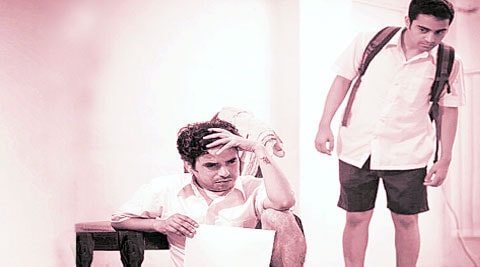Click here to follow Screen Digital on YouTube and stay updated with the latest from the world of cinema.
Brothers in arms
Hindi play Aa.Ba.Ja., an adaptation of Munshi Premchand’s masterpiece Bade Bhaisahab, is a commentary on India’s education system
 A production still of Aa.Ba.Ja
A production still of Aa.Ba.Ja
Written over a century ago by celebrated Hindi author Munshi Premchand, the short story Bade Bhaisahab, says playwright-actor Shashi Bhushan, will never fail to find relevance. A social commentary on the education system of India, the story deals with two brothers — Bhaisahab and his younger brother, Lalla. While the elder one is strict, disciplined and studious, Lalla is happy-go-lucky. However, despite spending hours studying, Bhaisahab fails while Lalla tops the class. Bhushan’s directorial debut play Aa.Ba.Ja., an adaptation of Bade Bhaisahab, was showcased in Pune. It is one of the two plays to be staged back-to-back on the same day by Mumbai-based theatre group Now. While an hour-long play A/126 Vrindavan Garden was scheduled at 8 am, was followed by Aa.Ba.Ja., after a 10-minute break.
“When my friend Saurabh Saraswat and I sat down for its adaptation, we decided against introducing contemporary elements. It has a certain nostalgic feel, which we wanted to retain,” says Bhushan. At the same time, he says, they went beyond the written text of the story. “Unlike novels, Bade Bhaisahab is a short story; it’s crisp in terms of description. The entire play takes place in the time span of two examinations. In Aa.Ba.Ja., we have incorporated scenes and conversations which are not present in the original. Besides, we have also used music,” says Bhushan. The lead cast of the play includes Gyanendra Tripathi as Lalla and Bramha Mishra as Bhaisahab.
On a personal level too, Bhushan relates to the theme of the play. “Be it in school or the years when I was pursuing a course in acting, I have experienced that education in India is more about examinations and less about understanding. All you are expected to do is to mug up notes and blurt them out on the answer sheets. The one who scores more has an upper hand in the society,” he says. Backing his view with the play’s storyline, he adds, “After Bhaisahab fails in the first exam and Lalla comes first, the elder brother becomes lenient with Lalla, who in turn, starts taking advantage of Bhaisahab’s silence.”
Bhushan says the message of the play is serious and socially relevant, but they have portrayed it in a subtle and humorous manner.
Just like in his play, when after his graduation from Shri Ram College of Commerce in 2005, he appeared for the entrance examination of Film and Television Institute of India (FTII) and failed; he took the conventional road and started preparing for MBA and UPSC examinations. “In reality, I was only ‘acting’ to study for the examinations to please my parents. Alongside, I kept doing theatre without their knowledge. In 2006, I reappeared for the FTII exam, and cleared it,” recalls Bhushan.
After finishing his acting course at FTII, Bhushan shifted to Mumbai in 2009. As an actor, he’s been a part of feature films that have not only done the rounds of film festivals, but have also won awards. Some of them include ID, Alif, The Last Act, Aadmi Ki Aurat Aur Anya Kahaniyan and Ballad of Rustom and Flyleaves.
The short films in which Bhushan has acted include National Award-winning film Kal 15 August Hai Dukaan Band Rahegi, Kasbe Ka Cinema Manager, Surang and Kaun Kamleshwar. In the field of theatre, he has acted in Mahesh Dattani’s plays Aam Ka Bageecha, The Big Fat City and The Alchemist.
Talking about Now, an association of artists from various backgrounds, which he recently formed along with his friend Vinay Sharma, Bhushan says, “Its canvas is much beyond theatre. Apart from plays, we also aim to produce films, documentaries and music under its banner.”


































